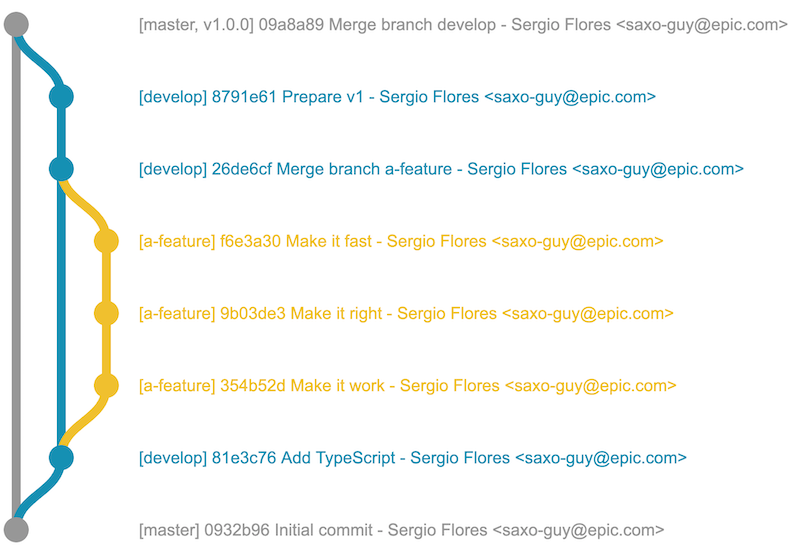
Security News
vlt Launches "reproduce": A New Tool Challenging the Limits of Package Provenance
vlt's new "reproduce" tool verifies npm packages against their source code, outperforming traditional provenance adoption in the JavaScript ecosystem.
@gitgraph/js
Advanced tools
@gitgraph/jsDraw pretty git graphs with vanilla JS.
This is the vanilla JS rendering library of GitGraph.js.
You have 2 options:
Get the bundle from one of the following sources:
Create an index.html file and start coding:
<!DOCTYPE html>
<html>
<head>
<!-- Load the JS file -->
<script src="https://cdn.jsdelivr.net/npm/@gitgraph/js"></script>
</head>
<body>
<!-- DOM element in which we'll mount our graph -->
<div id="graph-container"></div>
<!-- Use the `GitgraphJS` global variable to create your graph -->
<script>
// Get the graph container HTML element.
const graphContainer = document.getElementById("graph-container");
// Instantiate the graph.
const gitgraph = GitgraphJS.createGitgraph(graphContainer);
// Simulate git commands with Gitgraph API.
const master = gitgraph.branch("master");
master.commit("Initial commit");
const develop = master.branch("develop");
develop.commit("Add TypeScript");
const aFeature = develop.branch("a-feature");
aFeature
.commit("Make it work")
.commit("Make it right")
.commit("Make it fast");
develop.merge(aFeature);
develop.commit("Prepare v1");
master.merge(develop).tag("v1.0.0");
</script>
</body>
</html>
Serve your files—with npm, you can run npx serve .
You should see the following graph:

You need to have npm installed.
Create a new folder for your project and go there: mkdir your-project && cd your-project
Initialize your npm project: npm init -y
Install the package with npm: npm i --save @gitgraph/js
Install Parcel bundler: npm i --save-dev parcel-bundler
Now you can use createGitgraph to render your graph in a DOM element:
Create an index.html file:
<!DOCTYPE html>
<html>
<head>
<!-- … -->
</head>
<body>
<!-- DOM element in which we'll mount our graph -->
<div id="graph-container"></div>
<!-- This is for ParcelJS bundler -->
<script src="./index.js"></script>
</body>
</html>
Create an index.js file:
import { createGitgraph } from "@gitgraph/js";
// Get the graph container HTML element.
const graphContainer = document.getElementById("graph-container");
// Instantiate the graph.
const gitgraph = createGitgraph(graphContainer);
// Simulate git commands with Gitgraph API.
const master = gitgraph.branch("master");
master.commit("Initial commit");
const develop = gitgraph.branch("develop");
develop.commit("Add TypeScript");
const aFeature = gitgraph.branch("a-feature");
aFeature
.commit("Make it work")
.commit("Make it right")
.commit("Make it fast");
develop.merge(aFeature);
develop.commit("Prepare v1");
master.merge(develop).tag("v1.0.0");
Add start command in your package.json:
{
"name": "your-project",
"version": "1.0.0",
"scripts": {
+ "start": "parcel index.html"
}
Run npm start. You should see the following graph:

A bunch of scenarios has been simulated in our Storybook. Give them a look 👀
gitgraph.js packageHere's a guide to help you migrate to @gitgraph/js.
FAQs
Draw pretty git graphs in the browser
The npm package @gitgraph/js receives a total of 176 weekly downloads. As such, @gitgraph/js popularity was classified as not popular.
We found that @gitgraph/js demonstrated a not healthy version release cadence and project activity because the last version was released a year ago. It has 4 open source maintainers collaborating on the project.
Did you know?

Socket for GitHub automatically highlights issues in each pull request and monitors the health of all your open source dependencies. Discover the contents of your packages and block harmful activity before you install or update your dependencies.

Security News
vlt's new "reproduce" tool verifies npm packages against their source code, outperforming traditional provenance adoption in the JavaScript ecosystem.

Research
Security News
Socket researchers uncovered a malicious PyPI package exploiting Deezer’s API to enable coordinated music piracy through API abuse and C2 server control.

Research
The Socket Research Team discovered a malicious npm package, '@ton-wallet/create', stealing cryptocurrency wallet keys from developers and users in the TON ecosystem.